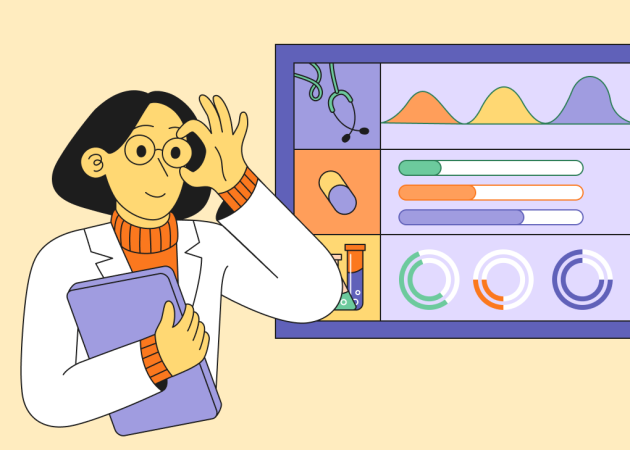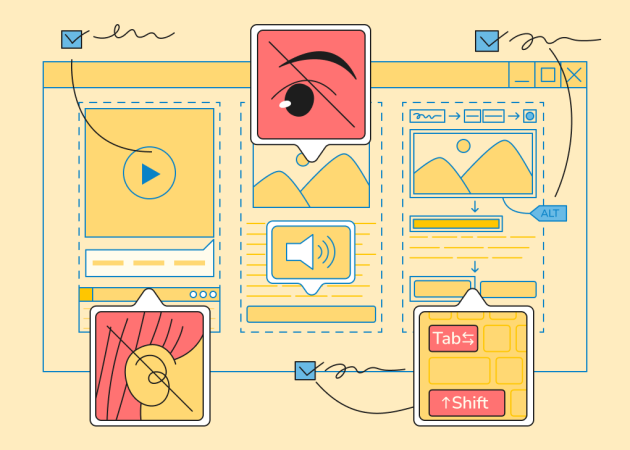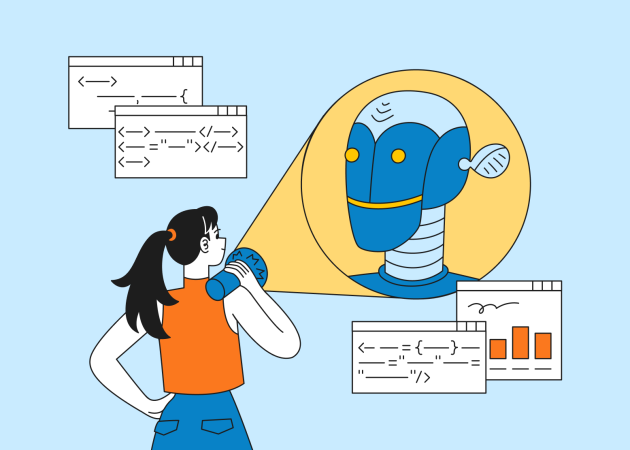
How Will AI Affect Software Development?
Contents
Contents
ChatGPT, GitHub Copilot, CodeGuru, and DeepCode — the introduction of these and other tools powered by artificial intelligence has changed the software development landscape, and there is no going back. They assist tech teams in writing, reviewing, and optimizing code, enhancing productivity and code quality. The question is, how far can this revolution go with AI rapidly evolving? And do software engineers need to worry about their jobs?
While AI is transforming certain aspects of software development, the unique skills and creativity of humans ensure that this profession will continue to thrive and evolve, complementing AI advancements rather than becoming obsolete. After all, for now, no technology beats humans when it comes to creativity, critical thinking, and complex problem-solving. However, the wide adoption of AI we are witnessing is certainly changing how companies approach software development. So, in this article, we explore AI’s impact on software development and what this means for specialists in the field and businesses.
How Does AI Affect Software Development?
Even though popular software development AI assistants have mostly been launched within the last few years, they have already become a major part of tech teams’ workflows. As of 2023, 92% of US-based developers used AI coding tools. The technology has proved effective: for instance, Jonathan Burket, a senior engineering manager at Duolingo, says that Copilot makes him 25% more efficient.
Let’s take a look at how exactly artificial intelligence influences the software development process and what benefits it brings.
Task Automation
AI significantly streamlines software development by automating repetitive and time-consuming tasks. For example, AI-powered tools can automatically configure development environments, manage dependencies, implement live chat features, and perform code refactoring, freeing developers to focus on more complex and creative aspects of their projects. This accelerates development cycles and reduces the potential for human error, leading to more reliable software solutions.
Code Generation and Optimization
AI-driven code generation tools like GitHub Copilot use vast code databases to suggest and even generate entire segments of code based on a developer’s comments or partial inputs. This functionality is especially valuable when developers work on projects requiring large amounts of computational resources. The capability extends to optimizing existing code, where AI can analyze codebases to identify inefficiencies or bugs and suggest improvements or refactorings. As a result, developers write more efficient, cleaner code in less time.
Code Translation and Interpretability
Sometimes, developers have to juggle multiple programming languages, for instance, for interoperability purposes or old code optimization. In these cases, AI tools like CodeMorph can facilitate code translation, preserving the original logic and intent while ensuring interoperability among different programming languages and platforms. This capability is invaluable in legacy system migrations and multi-platform development since it allows developers to work across various technologies without deep expertise in each. As a result, code translation processes become more time- and cost-efficient.
Quality Assurance
In quality assurance, AI significantly speeds up the testing process and enables more efficient and comprehensive testing processes. To be more specific, AI algorithms can predict where bugs are most likely to occur based on historical data, automating test case generation and ensuring a broader coverage than manual testing. This allows developers to detect and fix issues early in the development cycle before they escalate, which leads to improved effectiveness.
DevOps and Continuous Integration
For DevOps practices and continuous integration and delivery (CI/CD) pipelines, AI is crucial in automating and optimizing processes like code integration, deployment, and infrastructure management. For example, AI-powered systems can analyze and predict the impact of code changes and intelligently manage resources to optimize for performance and cost. This ensures a smoother, more efficient pipeline from development to deployment, enhancing the agility and responsiveness of tech teams to market or project demands.
For a more in-depth dive into the advantages and disadvantages of the technology, check out our article on AI in software development.
Demystifying AI
Even though AI is now commonly used by tech teams, there are a lot of concerns and questions regarding the future of the industry. How will AI affect software development? And will software engineers be needed in the future? Let’s address common misconceptions surrounding AI in the field.

Misconception 1. AI Will Take Over All Tech-Related Jobs
AI serves to automate mundane and tedious tasks like code reviews and debugging, aiming to minimize developers’ time on routine activities and enable them to concentrate on more innovative endeavors. Without a doubt, AI is a tool that can enhance human capabilities, leading to faster development cycles and higher software quality. Moreover, the evolution of AI may result in a reduction of entry-level programming jobs.
However, artificial intelligence cannot substitute human developers’ creativity and problem-solving abilities. The development of AI itself relies on human expertise, underscoring its role as a complement to human labor rather than a replacement. As jobs adapt and new roles emerge, AI technologies will both augment existing jobs and facilitate the emergence of new occupations.
Misconception 2. Artificial Intelligence in Software Development is Always Beneficial
AI in software development should not be perceived as a panacea, as its effectiveness varies depending on the context. The selection and implementation of AI technologies must be strategic and thoughtful to ensure they deliver value. For instance, for small projects or startups, the complexity and cost of advanced AI might not justify its use.
Moreover, AI’s effectiveness in software development often hinges on access to extensive, high-quality datasets for training. In domains like healthcare software development, where data is scarce and highly sensitive due to privacy concerns, this reliance poses a significant challenge. Besides, the opaque nature of some AI systems can challenge critical applications needing transparent decision-making.
While AI holds transformative potential for software development, its successful integration requires careful consideration of context, ethical implications, and data availability to harness its benefits and navigate its complexities.
Misconception 3: AI is Another Trend that Will Pass
Though artificial intelligence (especially generative AI) is a relatively new software technology, it has already profoundly impacted how we build, optimize, and maintain software. Unlike trends that create a buzz only to fade away when it comes to practice, AI shows tangible improvements in efficiency, accuracy, and innovation. AI-powered code completion tools fundamentally change the coding process, making developers more productive by reducing the time spent on routine tasks and allowing more focus on complex problem-solving. After all, there is a reason why GitHub Copilot has over 1 million paid subscribers.
Furthermore, AI is constantly adapting to meet real-world needs in software development, from the first design stages to the final steps of deployment and upkeep. This flexibility, along with continuous improvements in AI technology, secures AI’s role as a fundamental part of software development, making it more than just a passing trend.
The Future of AI in Software Development and Human Impact on It
Now that we’ve gone over the common myths, it’s time to answer the ultimate question about future software development and the impact of AI and human expertise on it.
Experts suggest software engineering transformation could happen in two stages:
- The “Creative” stage, where business analysts and software architects work with AI to fine-tune project requirements and design, using their expertise to steer AI inputs.
- The “Delivery” stage, where AI helps in coding, testing, and deploying, with senior engineers supervising and refining for deployment.
To strengthen this point, we’ve gathered a list of responsibilities that are not likely to be replaced by AI in the foreseeable future:
- Complex problem-solving: While AI will likely help with routine tasks, humans will be the ones who tackle challenging problems, conceptualize, architect, and design intricate software systems.
- Creativity and innovation: AI can come up with ideas based on what it knows, but inventing and testing new approaches, crafting unique user experiences, and developing new algorithms will still be on human experts.
- Ethics-related issues: Software engineers will continue to make sure that the end product is ethical, bias-free, compliant with privacy regulations, etc. These ethical aspects need human judgment.
- Context understanding: Collaborating closely with the stakeholders, software developers get the big picture, adjust the process to the unique requirements of the project, and create solutions that meet the end goal. While AI is good at spotting patterns, humans are integral for grasping complex situations and adapting.
- Collaboration and communication: Building software is a team sport involving lots of communication with colleagues, clients, and end users. And human engineers beat AI at interpersonal skills, translating the needs of various stakeholders into their work.
To sum up, while AI will continue to impact the field of software engineering, it is more likely to augment the work of software engineers rather than replace them entirely.
AI in Software Development Process
The transition to AI-driven software development within tech teams is a nuanced journey that involves the integration of advanced AI technologies and methodologies into established software development practices. This transition involves seven key steps described in the table below.

The journey towards AI-driven software development goes beyond innovation: it has to involve thoughtful reflection and a collective commitment to continuous improvement and ethical standards. However, the effort typically pays off: software development with AI can transform how tech teams operate and enhance the efficiency of the solutions they create.
Challenges and Solutions
In addition to multiple new opportunities, AI in software development comes with challenges that need to be addressed for successful implementation. Luckily, all of them have mitigation strategies. So, let’s get into it.
Complexity and Integration
Integrating AI into software development is a complex process due to the need to ensure seamless interaction between AI technologies and existing systems. This challenge requires a careful evaluation of how AI components can be incorporated without disrupting current workflows or causing compatibility issues. It’s a process that demands technical skill and strategic vision since developers must navigate the intricacies of AI algorithms and data requirements while maintaining the integrity of the overall software architecture.
To address the complexity and integration challenges, tech teams can adopt an incremental approach, starting with less critical projects to allow teams to adapt gradually and learn through experience, thus easing the integration process.
Security Vulnerabilities
Integrating AI into software development involves certain security challenges, as AI systems can be susceptible to unique vulnerabilities. To safeguard against various threats, developers need to incorporate robust security practices, such as conducting regular security audits of AI systems, adopting secure coding practices, and implementing AI-specific security measures. Educating development teams about potential AI vulnerabilities and staying updated with the latest security research can also strengthen defenses against evolving threats.

Interpretability and Explainability
The “black box” nature of some AI models presents a significant challenge when developers need to decipher the reasoning behind specific predictions or decisions the system makes. This issue can hinder trust and acceptance, as the inability to understand or predict the model’s behavior can lead to concerns about reliability and accountability in critical decision-making processes. Adopting explainable AI (XAI) frameworks and tools is a strategic response to this challenge since XAI aims to make the outcomes of AI systems more transparent and understandable.
Dependency and Overreliance
Overrelying on AI can lead to a decline in traditional coding skills. To prevent this, it’s crucial to maintain a balance between AI-assisted and manual development practices. Encouraging developers to engage in hands-on coding challenges and continuous learning can maintain and enhance their core skills.
The Learning Curve
AI tops the list of missing skills among IT teams. For instance, artificial intelligence and machine learning are the number one in-demand IT skills in the UK job market. Since the adoption of AI in software development demands new skills, tech companies have to invest in continuous education and training programs to empower developers to effectively utilize AI tools. One of the possible solutions here is partnerships with educational institutions and engaging in internal and external knowledge-sharing initiatives.
Environmental Impact
The extensive computing power required for training and running sophisticated AI models in software development can have a significant environmental footprint. For example, when OpenAI trained GPT-3, the work produced the equivalent of around 500 tons of carbon dioxide.
To mitigate this challenge, organizations can prioritize energy-efficient AI models and algorithms, opt for green hosting services, and leverage cloud computing resources more efficiently. Moreover, adopting practices such as model pruning and quantization can reduce the computational load without compromising performance.
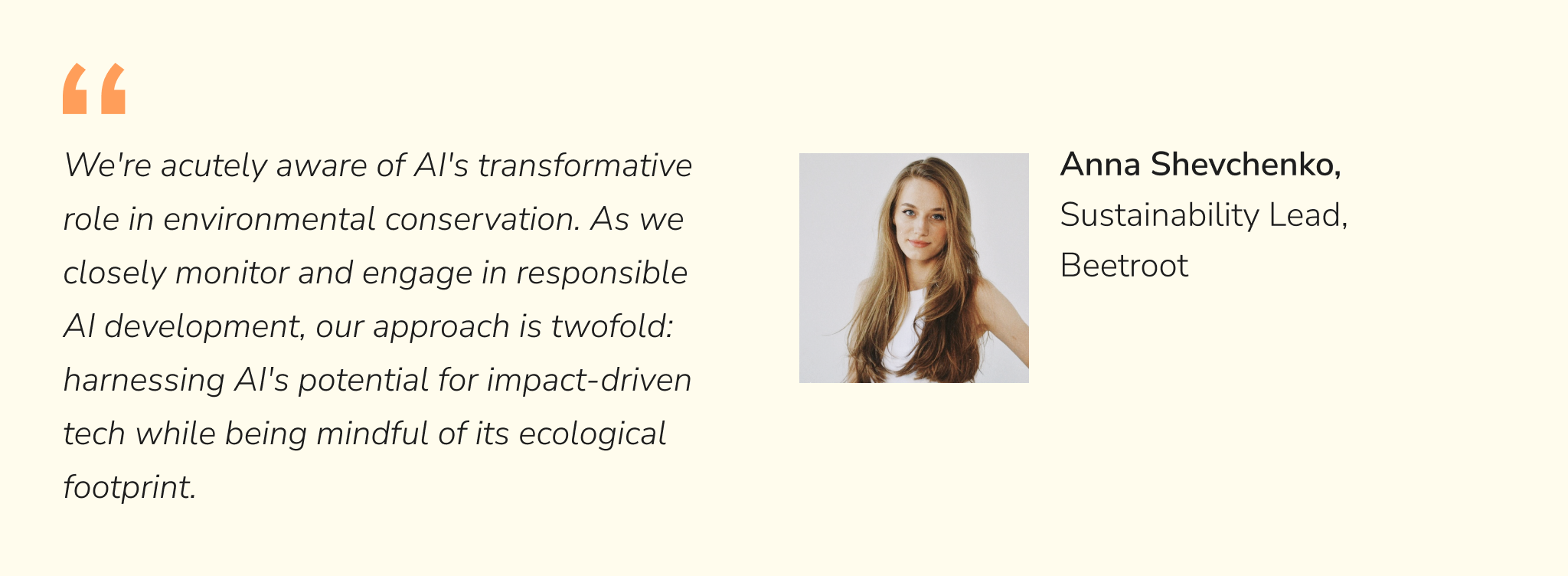
Venture Capital and the AI
The venture capital (VC) industry is also experiencing a significant transformation due to the integration of AI, altering traditional approaches to investment analysis, due diligence, and decision-making. In fact, according to Gartner, by 2025, more than 75% of venture capital and early-stage investor executive reviews will be informed using AI and data analytics.
AI’s predictive analytics and data processing capabilities are changing market analysis, enabling VCs to identify emerging trends and hidden opportunities ahead of the curve. This technological evolution extends to the due diligence process, where AI’s precision and speed in evaluating potential investments lead to more informed and secure investment choices. Moreover, AI tools monitor portfolio performance, highlight growth avenues, and anticipate the best exit timings, thereby maximizing investment outcomes.
The integration of AI in venture capital is expected to significantly impact the tech field and software development by driving targeted investments into cutting-edge technologies and innovative startups. As VCs leverage AI to identify promising trends and opportunities with greater precision, we can expect an influx of funding into areas like advanced software development tools, including AI-driven development platforms.
All things considered, it makes sense for software development companies to integrate AI into their workflows. AI adoption can lead to more efficient development processes, smarter problem-solving, and the ability to innovate at a faster pace. This aligns with the evolving landscape where venture capital is keen on funding AI-enabled advancements, positioning companies at the forefront of technological innovation, and making them more attractive to investors looking for smarter, more efficient solutions.
Beetroot’s Experience with AI Integration
In recent years, we’ve observed a significant rise in demand for AI solutions among our clients, a testament to the transformative power of artificial intelligence in driving tech advancements. Our journey with AI has allowed us to contribute to some remarkable projects, including Land Life Company, Iris.ai, and AI-powered genomics platform, helping our clients build expert tech teams and exploring the potential of AI in various domains.
In addition to working with AI implementation, Beetroot help tech companies upskill and train their staff via Beetroot Academy.
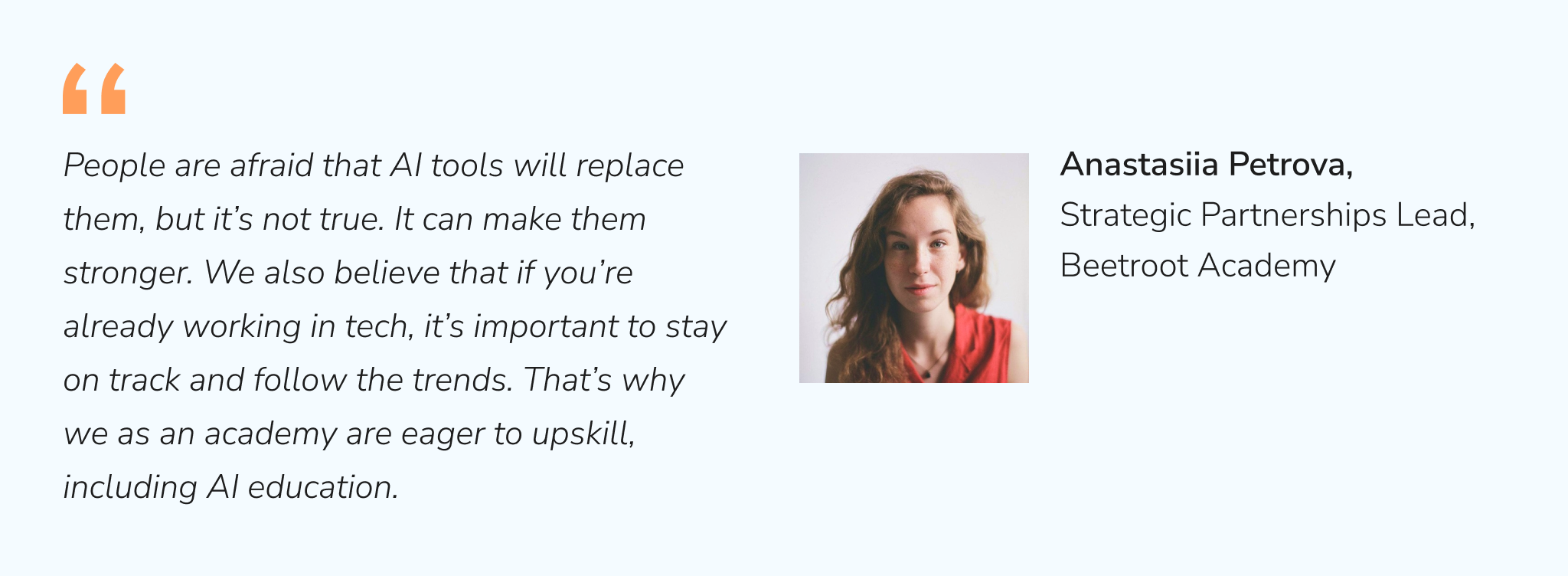
Beetroot Academy’s strategy for introducing AI education includes three core steps: internal education on AI, public events for both Ukrainian and international audiences, and enhancing educational courses. Each course by Beetroot Academy now has a dedicated module about AI tools. For more insights, be sure to check out our article. With more and more Beetroot’s tech specialists using AI, we’ve noticed that most manage to find a healthy balance between leveraging automated solutions and maintaining the essential human touch. Here is a quote from the online workshop on how ChatGPT and other AI tools transform the workflow of tech specialists:
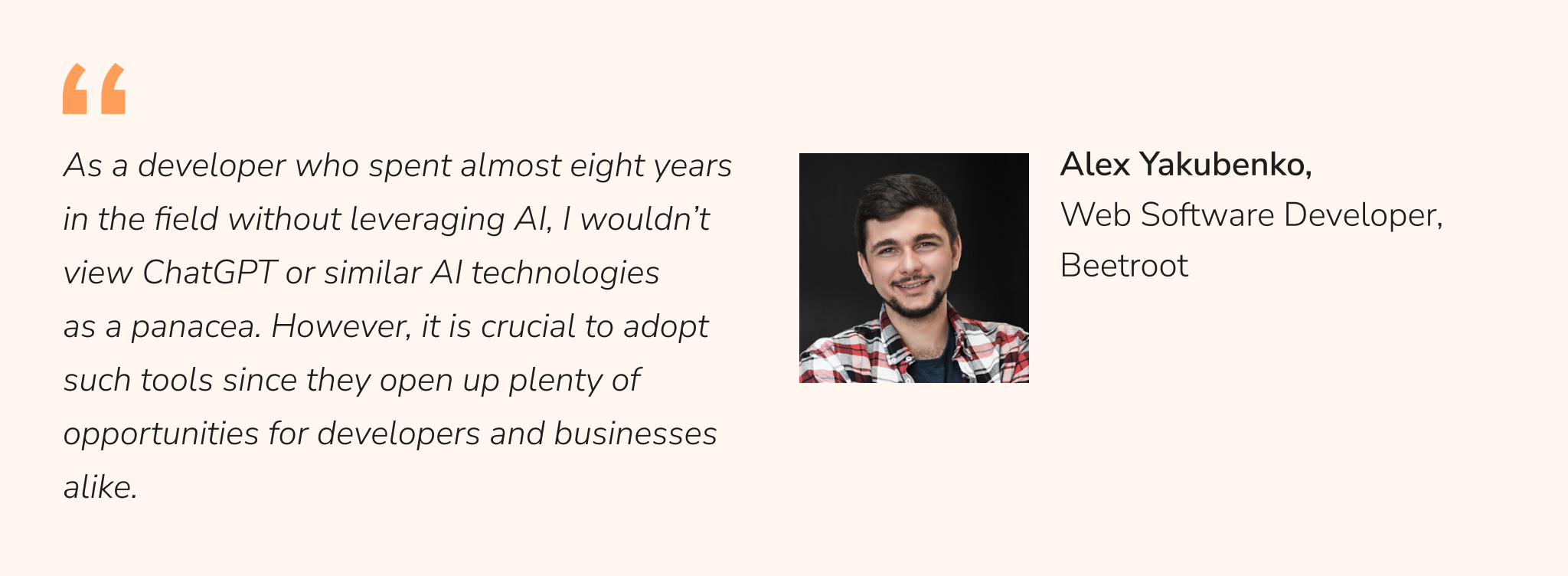
Embracing the Synergy of AI and Human Expertise
Apparently, tools like ChatGPT are pivotal in software development’s future, revolutionizing code generation, bug detection, and project management. Generative AI helps not only automate but also refine coding practices, boosting efficiency and quality. But will AI take over software development? Not in the foreseeable future. Instead, it will accelerate and enrich the software development landscape.
At Beetroot, our team’s development knowledge and flexibility in the face of rapidly evolving latest technologies in the software industry enable us to blend AI efficiency with irreplaceable human insight. This balanced approach allows us to ensure that while AI optimizes processes, our software development experts guide every project. If this approach resonates with you, reach out when in need a software development partner.
Subscribe to blog updates
Get the best new articles in your inbox. Get the lastest content first.
Recent articles from our magazine
Contact Us
Find out how we can help extend your tech team for sustainable growth.


